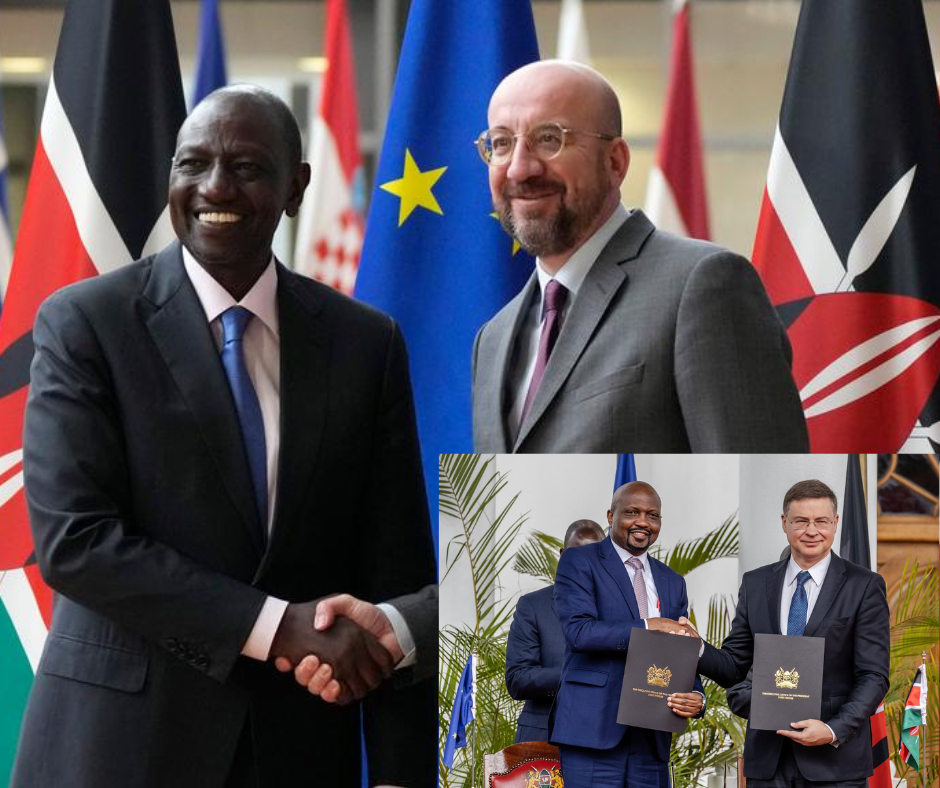Kenya and EU Sign Trade Deal, Boosting Economic Relations and Market Access
Kenya and the European Union have signed a trade deal, ensuring duty-free access for Kenyan farm produce to its largest export market. The agreement strengthens economic ties and opens doors for growth in Kenya's agricultural sector. Read more

Amanuel Biedemariam
Kenya and the European Union (EU) inked a trade agreement on June 19, 2023, ensuring that Kenyan agricultural products have duty-free access to its biggest export market. This momentous deal reinforces the economic ties between Brussels and Africa, particularly in light of China's growing competition.
Background of the Trade Deal: The Economic Partnership Agreement between Kenya and the EU was signed in record time, taking only seven months of negotiations. Kenya is a significant exporter of food and drink products, with around 20% of its exports being directed towards the EU. The agreement serves to promote trade between the two regions.
Key Objectives and Benefits of the Trade Deal: President William Ruto has announced that the agreement aims to boost investments and manufacturing in Kenya. Kenya will gain duty- and quota-free entry into the European market upon ratification. Over a period of 25 years, tariff reductions will be implemented for imports from the EU to Kenya, with only a few exceptions. Kenya's main agricultural exports to the EU are vegetables, fruits, tea, and coffee.

The Implications for Kenya: The recently signed trade deal aims to positively impact Kenya's economy by expanding market access and increasing growth opportunities in the agricultural sector. With duty-free access to the EU market, Kenya's competitiveness can be amplified, and foreign investment can be attracted. This agreement is important for Kenya's job creation, industrialization, and economic development.

Strengthening EU-Africa Economic Relations: Brussels is strengthening economic ties with Africa in response to China’s growing presence. The EU is enhancing trade and investment cooperation with African countries. Closer EU-Africa economic relations can foster mutual growth through trade agreements.

Here are the key elements of the EU-Kenya Economic Partnership Agreement.
- Trade and investment opportunities: The agreement grants free access to the EU market for Kenyan exports of goods, excluding arms. Trade liberalization is asymmetrical, with Kenya gradually opening its market to EU imports. Safeguards are included to address unfair trade practices, and rules of origin define eligible products for trade preferences.
- Agriculture and industrial development: Provisions focus on sustainable agricultural development, food security, rural development, and job creation. The EU commits to not applying export subsidies for agricultural products. Animal and plant health measures are addressed, including harmonization of standards and capacity building. EU development assistance supports compliance with standards and enhances trading opportunities in the agricultural sector.
- Trade and sustainable development: A dedicated chapter covers labor, gender equality, environmental, and climate matters. Fundamental labor rights, gender equality, and implementation of multilateral environmental agreements are emphasized. Cooperation and engagement are key for implementation, supported by regulatory dialogue and capacity building. Commitments are binding and enforceable, with a dispute settlement mechanism in place.
- Implementation and monitoring: The agreement establishes ministerial, senior officials, and technical bodies to oversee its implementation. Economic and development cooperation aims to enhance Kenya's competitiveness and smooth implementation of the EPA. Additional areas, such as trade-in services, competition policy, and intellectual property rights, can be added later. Civil society representatives have a role in implementation and a review process of the trade and sustainable development aspects is planned.
The implementation of the EU-Kenya Economic Partnership Agreement holds immense importance as it marks the first trade agreement with an East African Community nation to come into effect. This agreement serves to bolster the trade ties between the EU and Kenya, resulting in mutual economic benefits while also promoting sustainable development.
Conclusion: The trade deal between Kenya and the EU facilitates trade and promotes economic development. It can potentially increase investments, manufacturing, and job opportunities in Kenya. The broader implications of the deal include strengthening EU-Africa ties and fostering mutually beneficial partnerships.



Comments ()